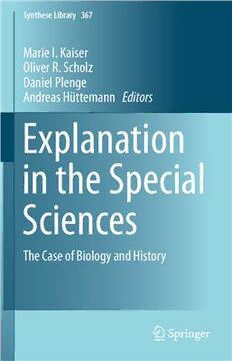Table Of ContentSynthese Library 367
Marie I. Kaiser
Oliver R. Scholz
Daniel Plenge
Andreas Hüttemann Editors
Explanation
in the Special
Sciences
The Case of Biology and History
Explanation in the Special Sciences
SYNTHESE LIBRARY
STUDIESINEPISTEMOLOGY,
LOGIC,METHODOLOGY,ANDPHILOSOPHYOFSCIENCE
Editors-in-Chief:
VINCENTF.HENDRICKS,UniversityofCopenhagen,Denmark
JOHNSYMONS,UniversityofTexasatElPaso,U.S.A.
HonoraryEditor:
JAAKKOHINTIKKA,BostonUniversity,U.S.A.
Editors:
DIRKVANDALEN,UniversityofUtrecht,TheNetherlands
THEOA.F.KUIPERS,UniversityofGroningen,TheNetherlands
TEDDYSEIDENFELD,CarnegieMellonUniversity,U.S.A.
PATRICKSUPPES,StanfordUniversity,California,U.S.A.
JANWOLEN´SKI,JagiellonianUniversity,Kraków,Poland
VOLUME367
Forfurthervolumes:
http://www.springer.com/series/6607
Marie I. Kaiser (cid:129) Oliver R. Scholz (cid:129) Daniel Plenge
Andreas Hüttemann
Editors
Explanation in the Special
Sciences
The Case of Biology and History
123
Editors
MarieI.Kaiser OliverR.Scholz
PhilosophischesSeminar PhilosophischesSeminar
UniversitätzuKöln WestfälischeWilhelms-UniversitätMünster
Köln,Germany Münster,Germany
DanielPlenge AndreasHüttemann
PhilosophischesSeminar PhilosophischesSeminar
WestfälischeWilhelms-UniversitätMünster UniversitätzuKöln
Münster,Germany Köln,Germany
ISBN978-94-007-7562-6 ISBN978-94-007-7563-3(eBook)
DOI10.1007/978-94-007-7563-3
SpringerDordrechtHeidelbergNewYorkLondon
LibraryofCongressControlNumber:2013955260
©SpringerScience+BusinessMediaDordrecht2014
Thisworkissubjecttocopyright.AllrightsarereservedbythePublisher,whetherthewholeorpartof
thematerialisconcerned,specificallytherightsoftranslation,reprinting,reuseofillustrations,recitation,
broadcasting,reproductiononmicrofilmsorinanyotherphysicalway,andtransmissionorinformation
storageandretrieval,electronicadaptation,computersoftware,orbysimilarordissimilarmethodology
nowknownorhereafterdeveloped.Exemptedfromthislegalreservationarebriefexcerptsinconnection
with reviews or scholarly analysis or material supplied specifically for the purpose of being entered
and executed on a computer system, for exclusive use by the purchaser of the work. Duplication of
this publication or parts thereof is permitted only under the provisions of the Copyright Law of the
Publisher’slocation,initscurrentversion,andpermissionforusemustalwaysbeobtainedfromSpringer.
PermissionsforusemaybeobtainedthroughRightsLinkattheCopyrightClearanceCenter.Violations
areliabletoprosecutionundertherespectiveCopyrightLaw.
Theuseofgeneraldescriptivenames,registerednames,trademarks,servicemarks,etc.inthispublication
doesnotimply,evenintheabsenceofaspecificstatement,thatsuchnamesareexemptfromtherelevant
protectivelawsandregulationsandthereforefreeforgeneraluse.
While the advice and information in this book are believed to be true and accurate at the date of
publication,neithertheauthorsnortheeditorsnorthepublishercanacceptanylegalresponsibilityfor
anyerrorsoromissionsthatmaybemade.Thepublishermakesnowarranty,expressorimplied,with
respecttothematerialcontainedherein.
Printedonacid-freepaper
SpringerispartofSpringerScience+BusinessMedia(www.springer.com)
Contents
1 Introduction:PointsofContactBetweenBiologyandHistory........ 1
MarieI.KaiserandDanielPlenge
PartI GeneralIssuesonExplanation
2 TheOnticAccountofScientificExplanation............................ 27
CarlF.Craver
PartII ExplanationintheBiologicalSciences
3 CausalGraphsandBiologicalMechanisms ............................. 55
AlexanderGebharterandMarieI.Kaiser
4 SemioticExplanationintheBiologicalSciences ........................ 87
UlrichKrohs
5 Mechanisms,Patho-Mechanisms,andtheExplanationof
DiseaseinScientificallyBasedClinicalMedicine....................... 99
G.Müller-Strahl
6 TheGeneralizationsofBiology:HistoricalandContingent?.......... 131
AlexanderReutlinger
7 EvolutionaryExplanationsandtheRoleofMechanisms.............. 155
GerhardSchurz
PartIII ExplanationintheHistoricalSciences
8 ExplainingRomanHistory:ACaseStudy .............................. 173
StephanBerry
v
vi Contents
9 CausalExplanationandHistoricalMeaning:HowtoSolve
theProblemoftheSpecificHistoricalRelationBetweenEvents...... 197
DorisGerber
10 DoHistoriansStudytheMechanismsofHistory?ASketch........... 211
DanielPlenge
11 PhilosophyofHistory:MetaphysicsandEpistemology ................ 245
OliverR.Scholz
12 CausalExplanationsofHistoricalTrends ............................... 255
DerekD.Turner
PartIV BridgingtheTwoDisciplines
13 AspectsofHumanHistoriographicExplanation:AView
fromthePhilosophyofScience............................................ 273
StuartGlennan
14 HistoryandtheSciences................................................... 293
PhilipKitcherandDanielImmerwahr
15 Explanation and Intervention in Coupled Human
andNaturalSystems ....................................................... 325
DanielSteel
16 BiologyandNaturalHistory:WhatMakestheDifference?........... 347
AviezerTucker
Contributors
StephanBerryhasworkedmanyyearsinthelabonproblemsfrombiophysicsand
biochemistry; today he is working as a freelance science author. His publications,
both academic titles and introductory texts for lay readers, cover issues from
biophysicsandevolutionaryscienceaswellashistoryandarchaeology.Acommon
thread in these seemingly disparate areas is the notion of processes: What are the
drivingforcesforprocesses,andhowcanwereconstructtheirtrajectories–within
the cell or the organism, during historical change on the scale of societies, and on
thegloballevelofbiologicalevolution?
Carl F. Craver is an associate professor in the Department of Philosophy and
thePhilosophy-Neuroscience-PsychologyProgramatWashingtonUniversityinSt.
Louis.HeistheauthorofExplainingtheBrain(ClarendonPress)andthecoauthor
ofTheSearchforMechanisms:DiscoveriesAcrosstheLifeSciences(Universityof
ChicagoPress).
Alexander Gebharter is a predoctoral research fellow at the Department of
Philosophy (Düsseldorf Center for Logic and Philosophy of Science) at the
Heinrich-Heine-University,Düsseldorf,andwithintheDFGResearchGroup“Cau-
sation, Laws, Dispositions, and Explanation at the Intersection of Science and
Metaphysics”. He obtained a degree (Mag. phil.) in philosophy at the Department
ofPhilosophyattheUniversityofSalzburgin2010.Hismainresearchinterestslie
withinthephilosophyofscience.
Doris Gerber is a Privatdozentin at the University of Tübingen, where she has
receivedherPh.D.in2001andherHabilitationin2010.Hermainareasofinterest
andcompetenceareactiontheory,socialphilosophy,philosophyofthehumanand
socialsciences,philosophyofhistory,ethicsandpoliticalphilosophy.Shehaspub-
lishedseveralarticlesonthesetopics.Herrecentbook,AnalytischeMetaphysikder
Geschichte.Handlungen,GeschichtenundihreErklärung(Berlin2012:Suhrkamp),
focuses on the problem of historical explanation and the underlying metaphysical
problems
vii
viii Contributors
Stuart Glennan is a professor of philosophy at Butler University in Indianapolis.
HereceivedhisB.A.inphilosophyandmathematicsfromYaleUniversityandhis
Ph.D.inphilosophyfromtheUniversityofChicago.Hisworkischieflyconcerned
with explanation, causation, and modeling. He is a leading advocate of the new
mechanicism in the philosophy of science. His publications include “Rethinking
Mechanistic Explanation” (Philosophy of Science), “Ephemeral Mechanisms and
Historical Explanation” (Erkenntnis), and “Mechanisms, Causes and the Layered
ModeloftheWorld”(PhilosophyandPhenomenologicalResearch).
Daniel Immerwahr is an assistant professor of history, specializing in twentieth-
century US foreign relations, at Northwestern University. He received his B.A.
from Columbia University, an additional B.A. from King’s College, Cambridge,
andhisPh.D.fromtheUniversityofCalifornia,Berkeley.Hehasalsoservedasa
postdoctoral fellow at Columbia University’s Committee on Global Thought. His
researchhasappearedinModernIntellectualHistory,theJournaloftheHistoryof
Ideas,amongotherplaces.
MarieI.KaiserisworkingasapostdocattheUniversityofGeneva,Switzerland.
She has studied philosophy and biology at the University of Münster, Germany.
In 2012, she received her Ph.D. from the University of Cologne, Germany, with
a thesis on The Ontic Account of Explanatory Reduction in Biology. During her
Ph.D. studies, she was a member of the DFG Research Group “Causation, Laws,
Dispositions, and Explanation at the Intersection of Science and Metaphysics”
and a visiting fellow at the Center for Philosophy of Science at the University of
Minnesota, USA. Her main research interests are the philosophy of biology and
thegeneralphilosophyofscience.Inparticular,herworkfocusesontheconceptof
reductiveexplanationinbiology,mechanisms,biologicalparthood,causalmodeling
in the life sciences, and philosophical issues raised by the sciences of complex
systems.
PhilipKitcheristheJohnDeweyProfessorofPhilosophyatColumbia.Heisthe
authorofbooksonawiderangeoftopics,namely,thephilosophyofmathematics,
the philosophy of biology, the growth of science, the role of science in society,
Wagner’sRing,andJoyce’sFinnegansWake.In2011,hepublishedtwonewbooks:
Science in a Democratic Society (Prometheus Books) and The Ethical Project
(HarvardUniversityPress).Hiscollectionofessays,PreludestoPragmatism,was
publishedinSeptember2012byOxfordUniversityPressandDeathsinVenice:The
Cases of Gustav von Aschenbach will appear from Columbia University Press in
2013.
UlrichKrohsisaprofessorofphilosophyofscienceandofnatureattheUniversity
of Münster. He has studied biochemistry and philosophy, received his Ph.D. in
biologyattheTechnicalUniversityofAachenandhis“Habilitation”inphilosophy
attheUniversityof Hamburg. Mostofhis presentresearchinterestsarelocated at
theinterfaceofbothfields:philosophyandhistoryofscience;philosophyofnature
and of technology; model theory; biomedical ethics; philosophy of cognition; and
epistemology. Before moving to the University of Münster, he has taught at the
Contributors ix
universitiesofHamburg,Vienna,Bielefeld,andBern,andheldresearchfellowships
at the Konrad Lorenz Institute for Evolution and Cognition Research and at the
UniversityofPittsburgh’sCenterforPhilosophyofScience.
GerhardMüller-StrahlhasstudiedmedicineandphysiologyinAachenandParis,
philosophyandmathematicsattheuniversitiesinGöttingen,Leipzig,andBochum.
He has been practicing neurology in Lausanne (CHUV) and psychiatry in Witten-
Herdecke.HehasbeenperformingbiorheologicresearchinLosAngeles(USC)and
in Göttingen at the Max-Planck Institute for Experimental Medicine, followed by
apositionasresearchgroupleaderforcardiovascularphysiologyinLeipzigatthe
Carl-LudwigInstitute.AttheuniversitiesinBochumandMünster,hisphilosophical
researchhasbeenfocusedonconceptsoforganisms(eighteenththroughtwentieth
centuries), on structure and change of physiological theories, on neo-Kantianism,
and on contemporary theories of explanation and causation with special reference
tothelifesciences.
Daniel Plenge studied Geschichtswissenschaft (history, historiography, historical
science, and science of history) and philosophy in Münster. He is a predoctoral
research fellow at the Department of Philosophy at the Westfälische Wilhelms-
UniversitätMünsterandamemberoftheDFGResearchGroup“Causation,Laws,
Dispositions,andExplanationattheIntersectionofScienceandMetaphysics”.
AlexanderReutlingerisapostdoctoralresearchfellowintheDFGResearchGroup
“Causation,Laws,Dispositions,andExplanationattheIntersectionofScienceand
Metaphysics”,andcurrentlyavisitingfellowattheCenterforPhilosophyofScience
(University of Pittsburgh). He obtained a Ph.D. from the University of Cologne
in 2011. His research interests lie within philosophy of science and metaphysics.
He is particularly interested in semantic and metaphysical questions concerning
causation, objective probabilities, and (ceteris paribus) laws in the social and life
sciences and in physics. Fairly recently, he got interested in epistemological and
metaphysicalaspectsofexplanation,laws,andemergenceincomplexsystems.
Oliver R. Scholz is a professor of philosophy at the University of Münster, Ger-
many, and a principal investigator in the DFG Research Group “Causation, Laws,
Dispositions,andExplanationattheIntersectionofScienceandMetaphysics”.His
researchinterestsincludeepistemology,metaphysics,andthephilosophyofscience.
In recent years, he has focused on social epistemology (testimony; expertise), the
philosophyofhistory,andthephilosophyofthesocialsciences.Heistheauthorof
Bild,Darstellung,Zeichen(1991,3rdedition2009)andVerstehenundRationalität
(1999,2ndedition2001),andhehaspublishedarticlesonmanytopics,interaliain
Synthese,Erkenntnis,andGrazerPhilosophischeStudien.
GerhardSchurzisaprofessorofphilosophyattheUniversityofDüsseldorf,where
heholdsthechairoftheoreticalphilosophyandisheadoftheDCLPS(Düssseldorf
Center for Logic and Philosophy of Science), which hosts four DFG research
projects. His major areas of research are philosophy of science, epistemology,
logic, cognitive science, and meta-ethics. Among his books are The Is-Ought

